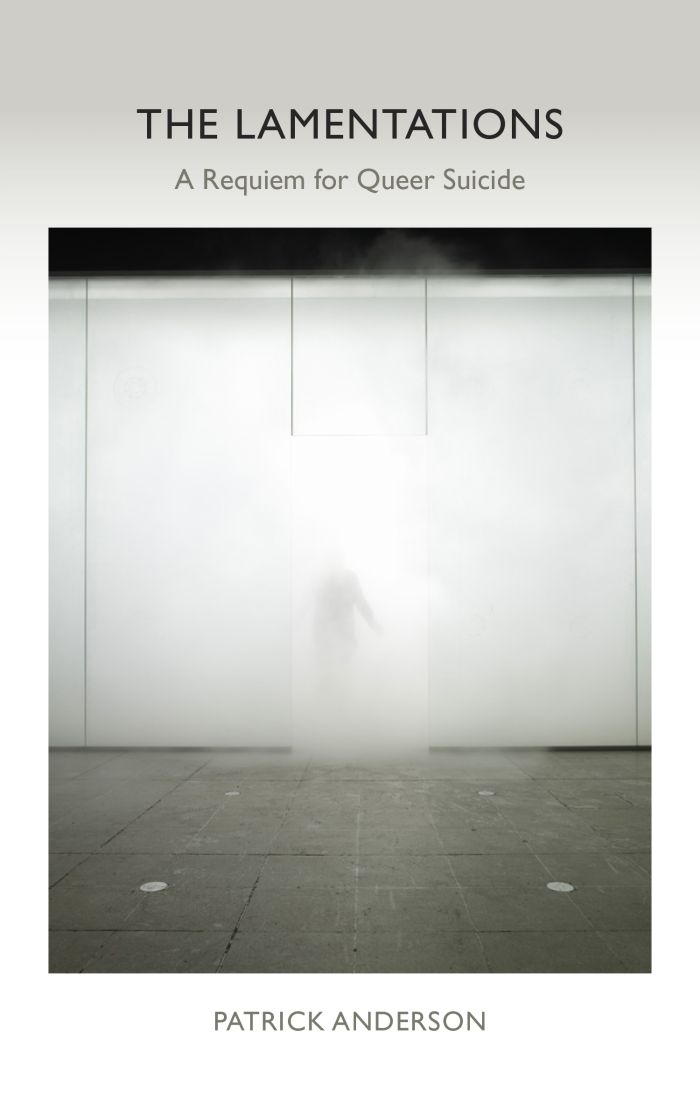The Lamentations
A Requiem for Queer Suicide

This book can be opened with

FINALIST, ASSOCIATION FOR THEATRE IN HIGHER EDUCATION (ATHE) OUTSTANDING BOOK AWARD
A moving journey through the shadows of queer suicide and a tribute to lives marked by struggle and beauty
The Lamentations explores the struggles and resilience within the queer community, offering a unique blend of historical analysis and emotional tribute to those affected. Author Patrick Anderson examines the phenomenon of queer suicide across various art forms such as film, theatre, and literature, tracing its evolution from the twentieth century to today.
Anderson brings to light the personal stories of individuals in the queer community who have ended their lives, compiling narratives from sources like newspaper articles, obituaries, and case studies. The book confronts the harsh realities of loneliness, shame, and oppression faced by many LGBTQ+ individuals, providing a poignant reflection on the societal challenges they face.
The Lamentations is more than a meditation on death; it’s a narrative of survival, mourning, and healing. Sharing personal accounts, including the losses of loved ones and friends, Anderson highlights the importance of memory and storytelling in celebrating the vibrancy of queer life amidst the sorrow of loss.
Accessible to a broad readership, the book transcends academic boundaries to address themes of love, loss, and the human spirit. It’s a compelling read for anyone interested in queer studies or anyone seeking to understand human experience through the lens of loss and legacy.
Patrick Anderson’s The Lamentations: A Requiem for Queer Suicide is incredibly moving, beautifully written, and important in its documenting of the persistent narrative trope of queer suicide. It offers a timely history of the present in a moment of increasing violence against LGBTQ+ people. I was frequently moved to tears by the many stories Anderson gathers here and the tender analysis of the mundane aspects of loss. I know others will be moved as well.—Lisa Diedrich, Professor of Women's, Gender, and Sexuality Studies at Stony Brook University and the author of the books Illness Politics and Hashtag Activism, Indirect Action, and Treatments
Through poetic and poignant prose Patrick Anderson fingers the trace of loved ones whose ghosts haunt the pages recounting their passing. This book is a reckoning, a coming to terms with what it means to queer suicide and in that queer(y)ing examine the depth of loss left in its wake. The Lamentations is, indeed, an archive of queer mourning.—E. Patrick Johnson, author of Honeypot: Black Queer Women Who Love Women
What do we owe our queer dead? Patrick Anderson’s The Lamentations gifts us with a map to understand how queer loss through suicide is not just an act of individual volition. With every story of queer loss that we lament we must consider how another ending would have been possible were it not for the social, political, and institutional structures that have demanded that queer suicide be understood as an “honorable thing.” Helping us break free from “the archetype of queer suicide,” as Anderson elegantly calls this dishonorable killer logic, The Lamentations provides the framework from and through which we might envision queer repair and redress with ethical precision. In this stunning and elegantly written book, Anderson serves as our Doula, confronting what it means to care for the memory of our queer dead and how their stories survive beyond their disembodiment in the everyday of our embodied lives. Structured as a secular requiem—a composition to honor the dead—The Lamentations is a meditation about how to do justice for the queer dead who came before through ethical, emotional, and embodied repair.—Lázaro Lima, author of Being Brown: Sonia Sotomayor and the Latino Question, The Latino Body: Crisis Identities in American and Literary and Cultural Memory, and co-editor with Felice Picano of Ambientes: New Queer Latino Writing.
At once elegy and love letter to his dearly departed, The Lamentations bears witness to the suffering of those who have passed by their own hand and the paradox of queer becoming through the emptiness of loss. Anderson is a philosopher-poet illuminating the intertwined nature of queer death and emergence.—David L. Eng, University of Pennsylvania
Prologue | 1
I. Introitus | 13
i. Office of the dead (Officium defunctorum) | 14
ii. All flesh (Omnis caro) | 19
iii. And he shall be like a tree (Et erit tamquam lignum) | 26
II. Dies Irae | 31
III. Kyrie Eleison | 51
i. Sorrowful is my soul (Tristis est anima mea) | 52
ii. What am I, miserable, then to say? (Quid sum miser tunc dicturus?) | 58
iii. My soul is weary with my life (Taedet animam meam vitae meae) | 70
IV. Lacrimosa | 75
V. Offertorium | 93
i. Through the tombs (Per sepulcra) | 94
ii. Seeking me, you sat down wearily (Quaerens me sedisti lassus) | 96
iii. Let not the abyss swallow them, lest they fall into obscurity
(Ne absorbeat eas tartarus, ne cadant in obscurum) | 101
VI. Sanctus | 108
i. I kneel with submissive heart (Oro supplex et acclinis) | 109
ii. Great trembling there will be (Quantus tremor est futurus) | 111
iii. Hail, true body (Ave verum corpus) | 128
VII. Benedictus | 132
i. Death has struck (Mors stupebit) | 133
ii. May the martyrs greet you at your arrival (Adventu suscipiant te martyres) | 142
VIII. Agnus Dei | 155
IX. Libera Me | 174
i. A heart reduced to ashes (Cor contritum quasi cinis) | 175
ii. When from the dust shall rise (Qua resurget ex favilla) | 183
iii. That which is hidden will appear (Quidquid latet apparebit) | 196
X. In Paradisum | 199
i. Eternal light (Lux aeterna) | 200
ii. Perpetual light (Lux perpetua) | 207
Coda | 217
Acknowledgments | 225
Notes | 229
Bibliography | 243
Index | 255





